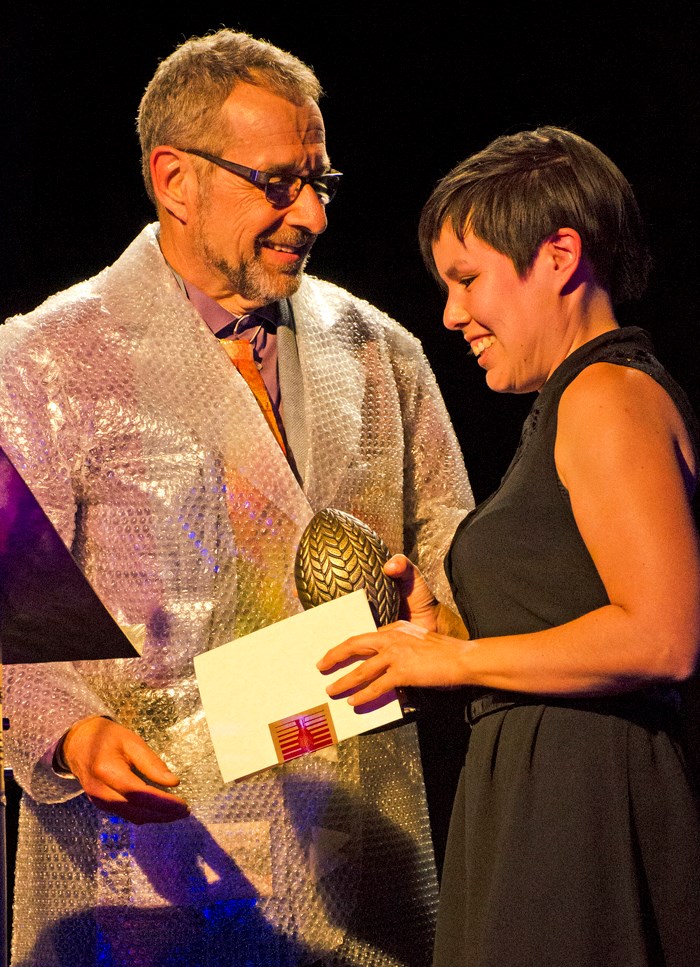When the high schoolers have been mentored, the films screened, the industry delegates schmoozed, the lobster eaten and the shotguns shot, it all comes down to a brief moment in the spotlight late in the evening on Saturday, the crowning of the top production of the year.
This year’s Golden Sheaf Award for Best of Festival at the Yorkton Film Festival (YFF) went to an Aboriginal People’s Television Network point-of-view documentary called Sex Spirit Strength.
The 45-minute film by rookie director Courtney Montour and veteran producer Tracey Deer tells the story of two Indigenous men who overcame nearly overwhelming stigma and shame to arrive at a safe place of self-identity, love and acceptance.
Jack Saddleback is a sociology student, who made history last year by becoming the first transgender president of the University of Saskatchewan Students’ Union.
Michael Keshane is a filmmaker, whose dark history on the mean streets of north central Regina left him HIV-positive and on the brink of suicide before his grandmother helped him make transformational change.
Montour also took home the Emerging Filmmaker Golden Sheaf for her efforts. Randy Goulden, the festival’s executive director said a filmmaker winning both Best of Festival and Emerging Filmmaker is unusual and a testament to the power and compassion of Sex Spirit Strength.
The other big winner of the night was The Complete Works, which took home the Founder’s Award, which is presented to an outstanding work depicting historical Canadian persons or events.
The Complete Works, a documentary by Justin Stephenson about the life and works of mid-20th century legendary Canadian poet bpNichol, entered the competition with great fanfare coming off a successful run on the festival circuit with high praise from the likes of Atom Egoyan and Michael Ondaatje.
While the YFF is technically international and national by design, it does do its best to promote and honour Saskatchewan as well. The Ruth Shaw Best of Saskatchewan Award recognizes Shaw, one of the original founders of the festival, for “her commitment to the Yorkton Film Festival, and to the province she loved, which was her lifelong home.”
This year’s Ruth Shaw Award went to an experimental piece entitled Motus by Play Creative, a Regina commercial video production company. The seven-minute film uses stunning footage and dramatic music to tell the story of Saskatchewan in an emotionally evocative and powerful montage.
Overall, Goulden could not have been more pleased with the 2016 edition of the festival.
“It was an incredible festival for 2016 and its to the credit of our board, our jury committees and all of our volunteers that for 69 years we’ve been able to keep this consistent in Yorkton,” she said.
During those seven decades, the YFF has always had a focus on supporting and promoting the craft of filmmaking. Goulden spoke with passion about a new edition to the festival this year, a mentorship program funded by RBC to the tune of $30,000 over three years.
The first group of five mentors and protégés connected at the festival this year and will come back for the 2017 to mark their progress and screen any work that results from the relationship.
“It shows the commitment of the commercial part of our province and the Royal Bank,” Goulden said. “It was wonderful because it will us do the work that we do with emerging filmmakers.”
Goulden was also very pleased this year to welcome Canada’s film commissioner and chair of the National Film Board (NFB) Claude Joli-Couer to the festival. It was the NFB that originally encouraged and supported the founding of the Yorkton Film Council in 1947 and that support has been continuous to the present day.
“There absolutely would be no Yorkton Film Festival without the people way back in the late 40s like James Lysyshyn who was instrumental in doing the film council here in Yorkton and then flipping it over to become a festival, and not just a festival for one week, it’s a year-round organization that we grow audiences for short film,” she said, adding planning for the next year has already begun.



